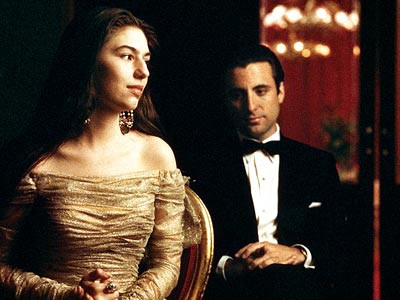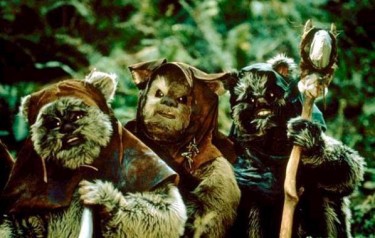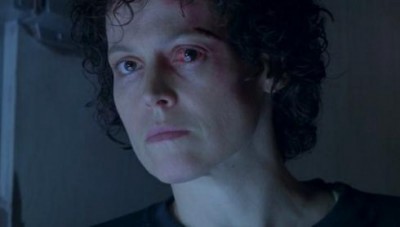Hollywood, Stop Botching Your Third Movies
Hollywood, Stop Botching Your Third Movies
by John Ore

Ewoks. Tina Turner. Religious space prisoners. Sofia Coppola. Here is where we sit for a moment and gravely reflect on all the horrific things that can go wrong when an otherwise amazing trilogy hits its third installment.
I’m not the first to notice that Hollywood has trouble with third acts — although I refuse to believe Mad Max: Beyond Thunderdome clocks in at 81% on the Rotten Tomatoes Tomatometer. Return of the Jedi brings up the rear of the Star Wars trilogy with a startling 79% (A New Hope and The Empire Strikes Back easily top 90%, I think we can all agree that it’s Empire or GTFO). The Godfather Part III pulls in a 68% (compared to 100% and 98% for the first two), Alien 3 clocks in at 42%, over 55 percentage points lower than Alien and Aliens, illustrating the perils of killing off Corporal Hicks instead of Ellen Ripley. The Matrix trilogy drops even more precipitously, from 87% for the movie that brought us “bullet time” through 73% for Reloaded, settling in at 36% for Revolutions, which is where the plot became more confused than Keanu Reeves’ acting. Most people agree: there’s a criminal amount of neglect when it comes to Hollywood and its third children in franchises. What the hell is going on here?
As the Oscars draw near, the next in a series about our strong movie opinions, past and present.
First, while we’ll be discussing both here, we should probably make a separation between true beginning-middle-end trilogies and their shameless money-grab cousins, wherein a promising (and unexpectedly profitable) movie, having gotten parlayed into a series, happens to die with the third film, often with further installments getting piled on anyway in a sort of ceaseless death-rattle (please stop with the sacrilegious Alien movies!). Others try to force the framework of a trilogy on three similar movies. Kevin Smith’s so-called Jersey Trilogy — comprised, though it is, of decent films — makes a mockery of the whole notion of a trilogy. This isn’t ‘Nam, there are rules. Joey Lauren Adams and Jason Lee play completely different characters in Mallrats and Chasing Amy. Jay and Silent Bob and oblique references to fucking a dead guy in the Quick Stop bathroom do not a trilogy make.
What’s the point of going Aristotelian with a three-part structure if you’re going to botch the end? For most movies, the second act is the wasteland where the plot goes to die, and it’s certainly the toughest act to write: the A plot descends, the B plot gains prominence, and your protagonists are imperiled. Franchises like Indiana Jones, Die Hard and Lethal Weapon lost their way with second movies (and in all three cases, piling on the sin with awful fourth installments), effectively destroying any hope of a cohesive franchise no matter how good the third movies ended up being.
But as far as trilogies that tanked in third act, let’s start with the most egregious example, the one that should instantly spring to mind whenever people think of trilogies gone wrong, the time when Francis Ford Coppola decided Sofia was old enough to ruin the Godfather trilogy. (Nothing against Sofia, who was only 19 and has long since made up for her father’s crime.) How bad was it? Let’s revisit this 1991 Entertainment Weekly
story:
‘’Well-meaning people tell me I am permitting a form of child abuse,’’ Sofia’s mother, Eleanor, wrote in a diary she kept for Vogue during the filming, ‘’that she is not ready, not trained for what is being asked of her, and that in the end she will be fodder for critics’ bad reviews that could scar her for years. They also tell me that Francis can’t afford to take a chance that would weaken his work at this point in his career.’’ Her fears were harshly and promptly realized the moment Paramount finally screened Godfather III for the press on Dec. 12. Many members of the New York audience snickered at Sofia’s portrayal of the Don’s innocent daughter — and laughed out loud at her pivotal scene at the movie’s climax.
But it wasn’t just Sofia’s casting, by any means. The movie came out in 1990, 16 years after we’d left off the Corleone family in the Oscar-winning Godfather Part II. With that kind of lead-time, you almost have to be deliberate in scuttling the trilogy with a crappy third movie. But here you are, The Godfather Part III, with your overacting and Andy García and boring Vatican plot and nepotism and middle-school-drama-class “climax” on the steps of an opera house in Palermo. Coppola and author Mario Puzo both contributed to this mess, and it may have been too much time had passed since the 1970s to have any hope of finishing the trilogy with a third movie that lived up to its predecessors. Perhaps they forgot what made the first two so amazing, perhaps times had changed. Who knows? The fact that 1990 also brought us Miller’s Crossing and Goodfellas just makes it all the more astonishing that Coppola ended the quintessential gangster trilogy with such a whimper.

Pandering to audiences, merchandizing and soundtrack sales may have doomed the trilogies ending with Jedi and Thunderdome. Like The Godfather Part II, Empire was a darker, brooding movie that left audiences hanging in the second act of the trilogy. It’s tough for The Road Warrior to be more dystopian than the dark and dubbed Mad Max — his dog gets killed in both! — but a bloodied Max standing in the middle of a post-apocalyptic highway doesn’t exactly bring closure. So it was a bit of a slap in the face when Georges Lucas and Miller decided to close out their respective trilogies with Ewoks and “We Don’t Need Another Hero.” Cutesy Hollywood crap didn’t make these altogether awful movies, but it certainly eroded the goodwill their movies had up until that point. Lucas gave the world Darth Vader, then traded the icy-wasteland disembowelment of a taunton for teddy bears in a verdant forest. Miller gave the world Mel Gibson, then traded the Ayatollah of Rock-and-Rolla and the Feral Kid for Aunty Entity and adorable children speaking pidgin Australian dreaming about tomorrow morrow land. It’s just not fair, to them or to us — or to Tina. Oh Christ, Miller is working on a 4th and 5th.
Perhaps some directors just lose their way, and can’t figure out how they got where they were in the first place. The Wachowskis’ metaphysical meandering in Matrix Revolutions showed us they couldn’t figure their own trilogy out any more than we could. They didn’t seem to realize that the spoon simply wasn’t there in the first place.

Or, you can blame a change in directors for the 3rd film bastardization of a decent franchise. God forbid you actually credit James Cameron with delivering two solid Terminator movies that survived a long stretch between installments (though half the length of time that separated Godfathers II and III). Jonathan Mostow and a brand-new cast (save Arnold) managed to ruin that with boring T-X Kristanna Loken. Cameron also came in and gave us a terrific follow up to Ridley Scott’s Alien with Aliens. But can we blame David Fincher’s too-late mercy killing of Ellen Ripley for the catastrophe that was Alien 3? Both are examples of overreaching after a great movie was followed by a blockbuster: these didn’t even need to be trilogies! But that didn’t stop the dark hand of Hollywood from overextending further into Terminator Salvation and the continuously-spawning monstrosities Alien: Resurrection and the AVP LOL-fest. (Don’t get me started on Prometheus.)
Trilogies aren’t the only victims. Franchises without cohesive beginning-middle-end structures similarly lose their minds with third films. Although Spielberg and Jeannot Szwarc were able to deliver two thrilling Jaws movies (I barfed after seeing the second one as a kid), not even Bess Armstrong could save Joe Alves’s 3D 3rd installment. What? I loved her in High Road To China. He, on the other hand, should have stuck with production design. John Rambo was our hero in two movies, a cheap propaganda prop in the third. Even Naked Gun’s Frank Drebin betrayed us after two films, or perhaps he was just lacking OJ Simpson’s comedic timing.
There’s a lot of wrong going on here, so has anyone done it right? Peter Jackson, clearly. The Lord Of The Rings trilogy is the undisputed champion of movie trilogies. One Trilogy To Rule Them All. These are epic, sweeping, engrossing films that stand on their own as tales and fit together seamlessly as a cohesive story. Perhaps it’s because they were based on a terrific literary trilogy in the first place, or the fact that they were all filmed together before the release of The Fellowship of the Ring, but they are pretty peerless when it comes to movie trilogies. Perhaps fittingly, they closed out with an Oscar haul for The Return of the King, going out on a high note rather than setting the third up for even more failure (sorry, I keep picking on Coppola, don’t I?). What else comes close? The Toy Story trilogy is a solid effort, even with a director change for Toy Story 3. I’m a big fan of Army of Darkness, but does the Evil Dead trilogy even belong in the same conversation?
Hollywood: please learn how to finish.
Previously in series: ‘Crash’: The Most Loathsome Best Picture Of Them All
John Ore is still salty about Ridley Scott lifting a Zulu war chant from Michael Caine’s first movie and trying to pass it off as Germanic.
